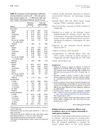 15 citations,
October 2012 in “InTech eBooks”
15 citations,
October 2012 in “InTech eBooks” Niosomes are a promising and effective way to deliver drugs through the skin.
 14 citations,
March 2022 in “Journal of inflammation research”
14 citations,
March 2022 in “Journal of inflammation research” Baricitinib shows promise as a new treatment for certain skin conditions like alopecia areata.
 14 citations,
November 2016 in “Annals of Internal Medicine”
14 citations,
November 2016 in “Annals of Internal Medicine” Tofacitinib, an arthritis drug, helped hair growth in alopecia universalis but long-term safety needs more research.
 11 citations,
April 2017 in “The European Journal of Contraception & Reproductive Health Care”
11 citations,
April 2017 in “The European Journal of Contraception & Reproductive Health Care” Cyproterone acetate with ethinyl estradiol is effective for treating skin symptoms related to high androgen levels, like in PCOS.
 9 citations,
February 2022 in “Nature communications”
9 citations,
February 2022 in “Nature communications” Rare changes in the KRT82 gene are linked to a higher risk of Alopecia Areata.
 9 citations,
December 2020 in “Dermatologic Therapy”
9 citations,
December 2020 in “Dermatologic Therapy” Certain drugs are effective for skin conditions like psoriasis, vitiligo, and hair loss.
 9 citations,
July 2020 in “Experimental Dermatology”
9 citations,
July 2020 in “Experimental Dermatology” Topical L-thyroxine may help with wound healing and hair growth but should be used short-term due to potential risks.
 9 citations,
February 2011 in “Biologics: Targets & Therapy”
9 citations,
February 2011 in “Biologics: Targets & Therapy” Topical calcineurin inhibitors, especially 0.1% tacrolimus ointment, are effective and well-tolerated for treating cutaneous lupus erythematosus but require more research for standard treatment guidelines.
 8 citations,
May 2010 in “Dermatologic clinics”
8 citations,
May 2010 in “Dermatologic clinics” New treatments for skin conditions in children include a preferred drug for birthmark reduction, proactive creams for eczema and vitiligo, a safe psoriasis medication, and special tissues and socks for eczema and fungal infections.
 7 citations,
June 2011 in “Movement Disorders”
7 citations,
June 2011 in “Movement Disorders” A specific gene mutation is linked to a hereditary form of dystonia that responds well to certain medications.
 6 citations,
February 2015 in “Anais Brasileiros de Dermatologia”
6 citations,
February 2015 in “Anais Brasileiros de Dermatologia” Patients with mycosis fungoides have a higher risk of heart disease.
 5 citations,
October 2018 in “American Journal of Clinical Dermatology”
5 citations,
October 2018 in “American Journal of Clinical Dermatology” Skin problems are common after stem cell transplants, and early treatment by dermatologists can improve patient outcomes.
 4 citations,
December 2011 in “Journal of The American Academy of Dermatology”
4 citations,
December 2011 in “Journal of The American Academy of Dermatology” Using more minoxidil solution can lead to better hair growth, but people often use only half the recommended amount. Education and motivation can improve results.
 4 citations,
June 2002 in “Clinical and experimental dermatology”
4 citations,
June 2002 in “Clinical and experimental dermatology” Effective treatment for hidradenitis suppurativa varies, with antibiotics commonly used and surgery as an option, but no single method is universally successful.
 3 citations,
April 2022 in “Farmacia”
3 citations,
April 2022 in “Farmacia” Certain foods and supplements can help treat skin diseases alongside medication.
 1 citations,
April 2017 in “Journal of Investigative Dermatology”
1 citations,
April 2017 in “Journal of Investigative Dermatology” Using a teletriage system greatly increased access to skin care for uninsured Latino immigrants at a clinic.
 1 citations,
January 2017 in “Expert opinion on orphan drugs”
1 citations,
January 2017 in “Expert opinion on orphan drugs” Adalimumab is the most effective treatment for severe hidradenitis suppurativa, but more research is needed to improve treatment options.
 1 citations,
April 2016 in “Journal of The American Academy of Dermatology”
1 citations,
April 2016 in “Journal of The American Academy of Dermatology” Ixekizumab helps improve life quality, physical ability, and work performance in patients with psoriatic arthritis who haven't used biologic drugs before.
 1 citations,
October 2013 in “Actas Dermo-Sifiliográficas”
1 citations,
October 2013 in “Actas Dermo-Sifiliográficas” Customized medications made through compounding can be beneficial for various skin conditions but require careful regulation and collaboration between doctors and pharmacists.
 1 citations,
April 2009 in “Expert Review of Dermatology”
1 citations,
April 2009 in “Expert Review of Dermatology” The new gel combining calcipotriene and betamethasone is effective and safe for treating scalp psoriasis.

New treatments for skin conditions show promise, especially Coacillium® for hair growth in young people with alopecia areata.
 April 2024 in “Dermatovenerologiâ, kosmetologiâ”
April 2024 in “Dermatovenerologiâ, kosmetologiâ” Actinic keratosis is a sun-induced skin condition that can potentially turn into skin cancer and requires various treatments to prevent this.
 April 2024 in “Dermatovenerologiâ, kosmetologiâ”
April 2024 in “Dermatovenerologiâ, kosmetologiâ” Actinic keratosis is a sun-induced skin condition that can potentially turn into skin cancer and requires treatment to prevent malignancy.
 April 2024 in “Journal of asthma and allergy”
April 2024 in “Journal of asthma and allergy” Abrocitinib effectively treated severe atopic dermatitis and mild alopecia areata in a 12-year-old boy after dupilumab failed.
 February 2024 in “PloS one”
February 2024 in “PloS one” Tofacitinib and adalimumab are promising treatments for cicatricial alopecia with few side effects.
 May 2023 in “Current Medicinal Chemistry”
May 2023 in “Current Medicinal Chemistry” Microneedle patches improve drug delivery for skin treatments and cosmetic enhancements.

The study aims to create a model to improve personalized and preventive health care.
 March 2023 in “Seminars in reproductive medicine”
March 2023 in “Seminars in reproductive medicine” PCOS often leads to sleep problems, especially obstructive sleep apnea, affecting overall health.
 January 2023 in “Postępy Dermatologii i Alergologii”
January 2023 in “Postępy Dermatologii i Alergologii” Azelaic acid treats acne, rosacea, and hyperpigmentation with minimal side effects.
 December 2022 in “Medical lasers”
December 2022 in “Medical lasers” Low-level laser therapy may help with hair regrowth in alopecia areata but its effectiveness for psoriasis and atopic dermatitis needs more research.






























